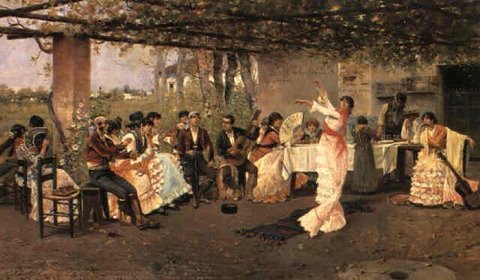Origins of flamenco
Flamenco, as it is known today, dates from the 18th century. There is still controversy about its origins as several theories are considered but none of them has not yet been historically confirmed.
It is generally acknowledged that flamenco grew out of the unique interplay of native Andalusian, Islamic, Sephardic, and Gypsy cultures that existed in. According to The Real Academia Española (in English Royal Spanish Academy), abbreviated as RAE, flamenco is associated with the gypsy ethnic group. (Flamenco, ca. 3. Adj. “Sociocultural forms associated generally with the gypsy ethnic group, specially rooted in Andalusia”.
Geographically, it is believed that flamenco began in the late 18th century inside the rural villas and cities of the lower Andalusia: Cadiz, Cordoba, Huelva and Seville.

La bailarina de flamenco (1879), Rafael Senet Pérez.